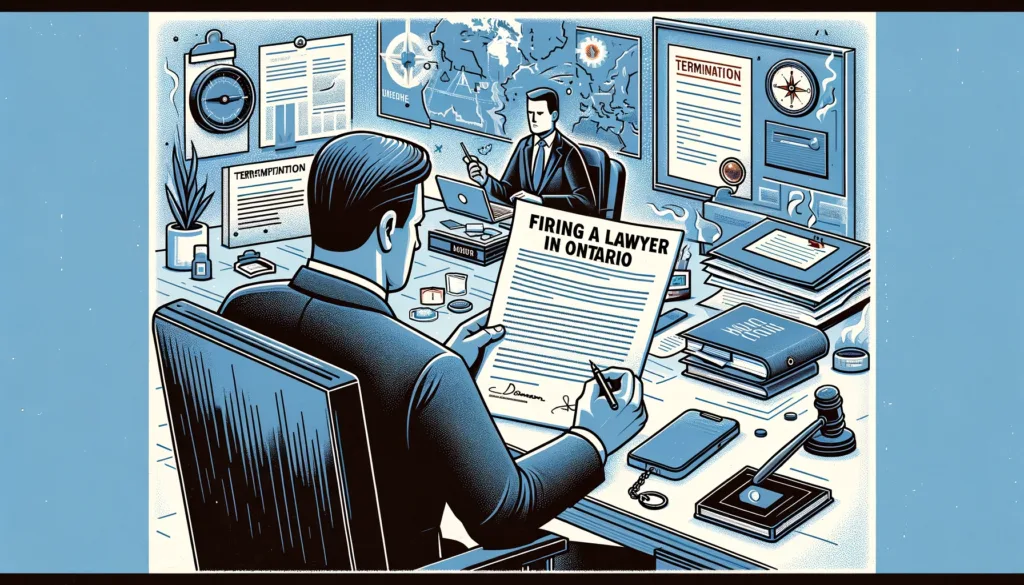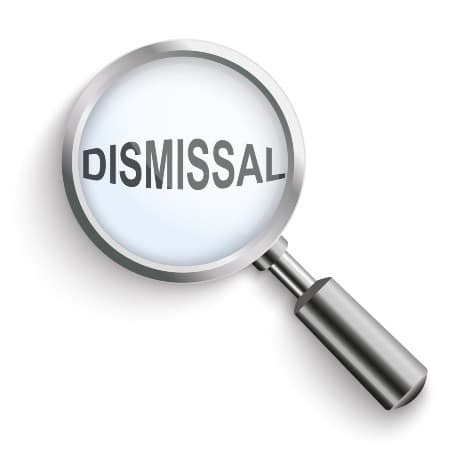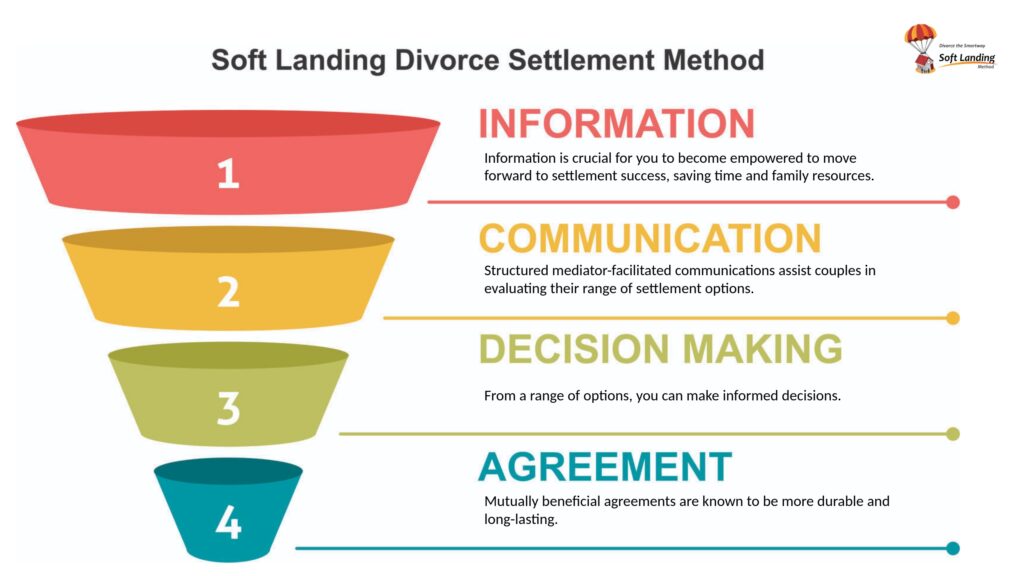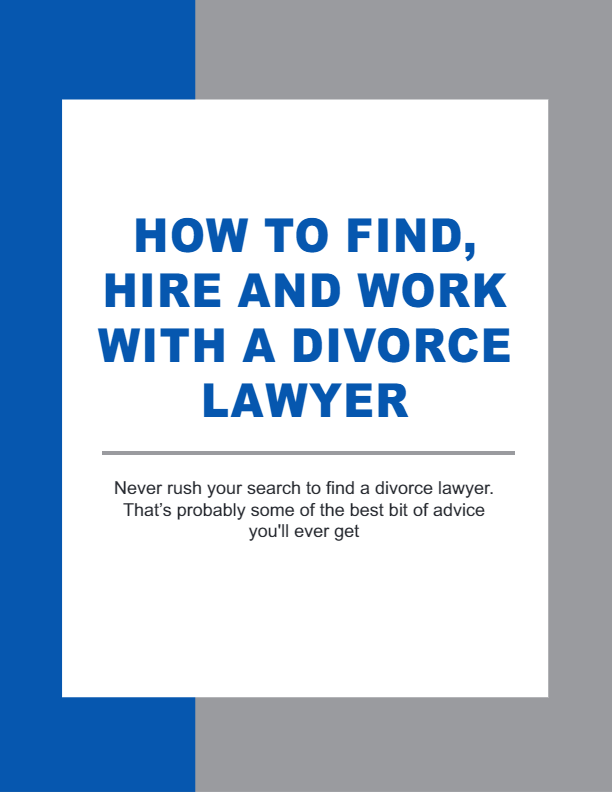How to Fire Your Lawyer – Everything You Should Know

Get Acquainted Call
Do you want a Soft Landing?
Have a few questions?
Learn More:
Schedule a 15-Minute Complimentary Call
Are you in need of more support with your current legal representation and considering how to fire your lawyer? The process can be intricate, particularly in Ontario. Our comprehensive guide, “How to Fire Your Lawyer – Everything You Should Know,” is designed to empower you with the essential steps and considerations to make this transition as smooth as possible.
Understanding your legal rights and options is paramount, whether you’re dealing with a law firm handling a family law case or a lawyer who isn’t responding to your communications within reasonable time frames.
We’ll guide you through everything, from identifying a good reason to terminate your lawyer and understanding the termination clause in your retainer agreement to filing a notice of termination using certified mail.
We’ll also assist you in finding another lawyer or law firm that can better meet your needs, including seeking free consultations and checking bar association records.
Learn about the implications of firing your lawyer, such as handling nonrefundable retainer fees and ensuring your legal questions are answered promptly. Once you’ve successfully navigated this process, you’ll feel a sense of relief and be on your way to securing the legal representation you deserve.
Knowing how to fire my lawyer effectively is vital if you’re facing an upcoming court date or need to handle wrongful death or injury claims. However, it’s important to be aware of the potential consequences, such as delays in your case or the need to pay additional legal fees. Read on to discover detailed legal information and practical advice to help you make informed decisions and secure the representation you deserve.
My Lawyer Is Not Fighting For Me - Is it possible to fire a lawyer?
You maybe thinking “my lawyer is not fighting for me”, having to fire your lawyer will hardly be an easy decision, but it can often be necessary. When you are in the middle of a divorce, fighting for custodial rights or fair property distribution, the last thing you need is an attorney you are unable to work with.
 Although this is a subject that is not often discussed, you should know that you have the right to fire your lawyer at any time. Just as there is no compulsion on you to hire a lawyer, you are free to change your legal counsel or decide you don’t want one anymore.
Although this is a subject that is not often discussed, you should know that you have the right to fire your lawyer at any time. Just as there is no compulsion on you to hire a lawyer, you are free to change your legal counsel or decide you don’t want one anymore.
Another thing you should know is you don’t necessarily need to give a reason for your decision. You don’t even need one. However, it is often best to think about why the relationship will no longer work as your decision may delay your case or increase your legal fees.
How do you know a bad lawyer?
There are many reasons why you may come to this decision. For instance, where your divorce lawyer cannot get the results you want, there’s usually no point to retaining their services. Other reasons include where you are no longer comfortable with their services or even in situations where you feel you are being excessively billed.
Regardless of your reasons for firing your lawyer, you should understand how to go about the process correctly. Despite the risks of changing your divorce attorney while your case is ongoing, it is possible to minimize these risks and preserve your chances of a positive outcome.
If you have decided to terminate the relationship, your next question will be “how to fire my lawyer”. In this article, we will explain the steps you should take when firing your lawyer and what you can do to recover your files and fees, where necessary
How to fire a lawyer nicely in 5 steps
Once you have made the decision to part ways with your attorney, you should look to make the decision official. This means informing your lawyer about your decision and formally ending their involvement in your case.
While the process is basically the same in most cases, it may differ slightly depending on your contract with the lawyer, whether your case is currently in court and other factors.
Follow these steps in terminating your relationship with your attorney:
Consult the retainer agreement: The contract that you signed when engaging the lawyer to work for you is the retainer agreement. The contract may also be called an engagement letter or fee agreement. The agreement would usually contain the terms of your relationship with the lawyer. It may also specify how the relationship may be brought to an end. If such a procedure is specified, follow this in terminating your relationship with the lawyer.
Hire a new lawyer: Before you begin to follow the procedure in the agreement or take the next steps here, it makes sense to go secure new representation first. There are several reasons why this would be best. Hiring a new lawyer before terminating the old one ensures that you do not suffer any lapse in representation. Your case will proceed with very little interruption if there’s already a new lawyer waiting to take over as soon as you fire the current one. The new attorney can also be helpful in looking over your retainer agreement and providing assistance with understanding the steps you should take to terminate your relationship with the old attorney.
Send a termination letter: If you’re clear on the procedure in the retainer agreement, follow those steps. If there’s no procedure specified, your next step should be to send a termination letter to the attorney. You should send this letter by certified or registered mail so you have proof that the attorney received the letter.
As a rule, you should do the following in your letter:
-
- Include a short and formal statement informing the attorney that you would no longer be needing their services. You do not have to include a reason.
- Request that the attorney stop work on all pending matters
- Request that your files be returned to you immediately. The files should include any letters you wrote to the attorney instructing them on your case, documents or exhibits you made available to the attorney and other documents or information personal to you. These files legally belong to you and you are entitled to recover both originals and photocopies.
- If you paid a retainer, you should demand a refund of any unearned fees
- Request an itemized bill of charges outlining all fees and expenses that are outstanding, if any
-
Finalize arrangement on transfer of files: The attorney should acknowledge the letter and proffer an arrangement for how you will recover your files. It is necessary to do this as quickly as possible so your new attorney can start work without delay.
Inform the court: Finally, if your case was already in court, you will need to inform the court about your change of counsel. This may be done on your behalf by the new attorney or in collaboration with the old.
What happens if your case was on a contingency basis or if you still owe fees?
A case is on a contingency basis when an attorney agrees to work on a case without being paid but on the condition that they take a percentage out of any recovery. This arrangement is common in personal injury cases.
If the attorney agreed to take on your case on a contingency basis, there is nothing stopping you from terminating the relationship. However, they will still be entitled to recover fees and expenses for the work they have already done on your case.
Your new attorney will usually be responsible for paying the previous lawyer out of whatever recovery is eventually won in your case.
If you still owe fees on work already done on your behalf by the previous attorney, nothing stops you from terminating the relationship either. However, you will be required to settle all outstanding bills with the attorney
How to get the Lawyer Retainer back!
Unfortunately, there are often situations where a client was unnecessarily or illegally billed by their attorney. This can often be the case in contingency fee arrangements or as regards deductions for disbursements – out of pocket expenses. If your lawyer billed you for their services in excess of what was agreed, you may be entitled to recover your money.
However, you must be certain that you were either overbilled or that the charges do not add up.
Follow these steps if you are in this situation:
My Divorce Lawyer is not Fighting For Me
If you feel that your divorce lawyer is not fighting for you, consider exploring alternative solutions that may better serve your interests. At DTSW, we offer Divorce Financial Planning and mediation services designed to provide a more collaborative and efficient approach to resolving disputes. Our team of specialists is dedicated to supporting you through this challenging time and helping you secure a brighter future.
Request copies of the retainer agreement: Your first step should be to understand if the billing was as per your agreement. The Ontario Rules of Professional Conduct for attorneys requires that lawyers clearly explain their fees and necessary expenses to clients before acting on their behalf. These fees should be outlined in the retainer. If things still do not add up after going through the agreement, your next step should be to contact the attorney.
Talk to the lawyer about the bill: Contacting the attorney does two things. First, it lets you clarify your understanding of the retainer agreement so you can be certain you did not misunderstand your applicable fees. Second, it lets you give the attorney an opportunity to remedy the problem, as you may have been unintentionally overbilled.
Request a refund: If it turns that you were really overbilled and the attorney has not done anything about it, your next step should to formally request a refund. Billing you more than is necessary is not only unprofessional, it may be ground for a civil action against the attorney.
Take administrative action: If the attorney still fails to remedy the situation, you may take administrative action by contacting the Ontario Supreme Court of Justice’s Assessment Office. They will review your bill of charges and advise you on the next steps to take.
Can a Lawyer Drop a Client on Retainer
Yes, a lawyer can drop a client on retainer, but they must follow specific conditions and ethical guidelines. Lawyers can withdraw from representing a client if there is a valid reason, such as non-payment of fees, a communication breakdown, or if continuing the representation would violate law or ethical rules. However, they must provide adequate notice and ensure the client has enough time to find new representation. For detailed information, consult your retainer agreement and local legal regulations.
Lawyer Termination Letter
Re: Termination of Legal Services
Dear [Lawyer’’s Name],
I am writing to formally notify you that I am terminating my legal representation agreement with you, effective immediately/as of [date]. As per our agreement dated [date of agreement], I am providing [number of days] days’ notice.
The reason for this decision is [briefly state the reason, e.g., “due to a change in my legal needs” or “as a result of financial constraints”].
Please provide me with a copy of my case file and an itemized statement of my account. I will settle any outstanding balances as per our agreement.
Thank you for your services thus far. Please confirm receipt of this letter and the initiation of the termination process.
Sincerely,
[Your Signature (if sending a hard copy)] [Your Printed Name]Table of Contents
- My Lawyer Is Not Fighting For Me - Is it possible to fire a lawyer?
- How do you know a bad lawyer?
- How to fire a lawyer nicely in 5 steps
- What happens if your case was on a contingency basis or if you still owe fees?
- How to get the Lawyer Retainer back!
- My Divorce Lawyer is not Fighting For Me
- Can a Lawyer Drop a Client on Retainer
- Lawyer Termination Letter
- Rethinking “Lawyering Up”
- 10 Reasons to Seek Mediation and Financial Guidance First in Divorce
- Timing is Everything
- Is it bad to switch lawyers?
- Approximately 50% of people claim they are unsatisfied
- What is the most common complaint against lawyers?
- Fault of the lawyer or the Overburdened Court System
- Litigation process’s rhythm
- How often should I hear from my lawyer?
- Return calls within one business day
- Can they realistically cater to your needs
- Lawyer’s style of litigation
- Lawyers may not like one another
- 14 Key Takeaways about Firing Your Lawyer
- When is it too late to Fire your Lawyer
- Try This Before Firing Your Lawyer
- At DTSW
- Finding a Family Lawyer: Ultimate Guide with Top Tips
- Related Posts
Rethinking “Lawyering Up”
10 Reasons to Seek Mediation and Financial Guidance First in Divorce
In the throes of a divorce or separation, it’s tempting to seek legal advice immediately – after all, isn’t that what we’re taught to do? However, while legal guidance is crucial, it isn’t necessarily the best first step. Separation and divorce proceedings are about 90% about finances and children rather than purely legal matters. Today, let’s debunk this misconception and explore why it might be better to collaborate with a mediator and CDFA before reaching out to a lawyer.
Timing is Everything
Like in life, timing is everything when it comes to hiring a divorce lawyer. Knowing when to seek legal counsel during a divorce or separation is crucial to achieving the best possible outcome. Here are some key considerations to determine the right time to hire a divorce lawyer:
Control the Process: Working with a mediator and CDFA, you and your spouse maintain control over the process, making decisions collaboratively instead of dictating them by attorneys or the court.
Financial Clarity: A CDFA brings financial expertise to your case, helping you understand financial decisions’ short- and long-term implications.
Comprehensive Disclosure: These professionals guide you in gathering necessary disclosure documents, ensuring no financial stones are left unturned before consulting a lawyer.
Focused Negotiations: Mediators help parties stay focused on their real intentions and the main issues, preventing distractions from the path of resolution.
Cost-Effective: Mediation and financial analysis can often be more cost-effective than immediately “lawyering up” while offering comprehensive guidance.
Reduced Animosity: Opting for mediation first may reduce the antagonism between parties. The traditional “lawyering up” approach can create an adversarial atmosphere that fuels hostility.
Holistic Approach: Mediators and CDFAs consider monetary and non-monetary aspects, such as children’s welfare, providing a more holistic view of your situation.
Informed Legal Decisions: A solid understanding of your finances and intentions empowers you to make more informed decisions when seeking legal advice.
Protection of Rights: The modern family law system ensures your rights are protected – consulting a mediator or CDFA first doesn’t negate this protection.
Better for Children: Focusing on finances and children first helps create a more stable environment during this transition, which is often better for children.
Remember, the goal is to make your divorce or separation as smooth as possible for all involved. Therefore, starting with a mediator and CDFA might not be the traditional route. Still, it could be right for you, providing clarity, control, and a comprehensive view of your situation before you step into a lawyer’s office. As always, every situation is unique, so consider your options carefully and seek the best approach for your family.
Is it bad to switch lawyers?
Approximately 50% of people claim they are unsatisfied
Approximately 50% of people in the midst of a divorce claim they are unsatisfied with their legal representation. Many become so dissatisfied that they decide to fire their lawyer before hiring a new one. A number of these individuals become just as dissatisfied with their new lawyer. Some people go through one lawyer after another before a divorce can be finalized. Invariably, they end up still being unhappy with whoever represents them. After several unsettling experiences in the early stages of my career, I decided that never would I ever become a divorcee’s third professional. How could I be successful when two lawyers before me weren’t? In my opinion, this rule prevented me from serving many miserable clients.
What is the most common complaint against lawyers?
I am telling you this because I need you to understand that your dissatisfaction with a lawyer could be because of their incompetent, indifferent, rude, or poor service. In such cases, you are encouraged to replace lawyers. However, you must be certain that the issue isn’t on your end. How realistic are the expectations you have about legal representation? If a lawyer does not return calls quickly enough for you, this may be because of another client they are serving at the time – one whose needs are far more urgent. Perhaps you expected the lawyer to hold your hand from start to finish of the case.
Fault of the lawyer or the Overburdened Court System
Perhaps you are calling your lawyer impulsively and often rather than managing your meetings more professionally. If your upcoming divorce is moving at a snail’s pace, is it the fault of the lawyer or the overburdened court system? You opted to litigate at a time when faster alternatives were available. Did you do so because of the cost and time associated with your options? If you were dead set on hiring the county’s star litigator, thinking that doing so would achieve successful results, can you really be surprised when this lawyer cannot allocate the time and attention you demand of them?
Litigation process’s rhythm
After reviewing your behaviour and expectations and concluding that you are faultless, you can focus on your lawyer’s deficiencies. Many busy lawyers allow a litigation process’s rhythm to determine how fast a case progresses. If both spouses are not in agreement on several issues, a lawyer will need to perform extensive research to get ready for a potential trial in case a settlement is not negotiated. This is something that cannot be rushed. Take deposition scheduling, for instance.
How often should I hear from my lawyer?
With busy schedules and phone tag, it might be months before all lawyers involved in the case can pick a date when they are available. When that date arrives, at least one lawyer will be contacted by a court to begin the trial. This may warrant further delaying a deposition. Many lawyers are sensitive to their clients’ time. They reduce the amount of depositions taken and work effortlessly alongside the opposing lawyer, who is doing the same. To put it another way, a thoughtful lawyer is capable of moving cases along at a faster speed. But will they care enough to do so? Some are considerate, others aren’t. This is also applicable to telephone calls.
Return calls within one business day
Many lawyers go out of their way to return calls within one business day; others respond when they have free time. If the lawyer you hired thinks you are annoying, then your call might be the very last one they return. As such, it is imperative to establish how compatible you are with a lawyer – ideally well before they are paid. If you are anxious and require excessive reassurance, tell the lawyer this in advance.
Can they realistically cater to your needs
Ask them if they can realistically cater to your needs. Occasionally, when it comes to “high maintenance” clients, lawyers will assign sympathetic paralegals to conduct handholding on their behalf. However, if this isn’t enough for you, ensure that you’re okay not getting phone calls every day from the lawyer. If you are a picky person, consider choosing a lawyer who isn’t as busy.
Lawyer’s style of litigation
One aspect that could hold your case up is the lawyer’s style of litigation. Many people cultivate hard-nose projections by pressuring adversaries into litigating everything. This cultivates tough imagery while generating high legal costs. If this is the kind of lawyer you will hire, an honest conversation and a replacement is probably the better way to go. The style of a lawyer has a larger effect than the average client realizes. While other lawyers know which of their peers are difficult lawyers to collaborate with, they won’t tell you. I am very aware which lawyers are the most difficult.
It is in your best interest to determine the lawyer’s style before paying a retainer. Consider finding a different lawyer if you feel you need to.
Lawyers may not like one another
Another issue is that the lawyers facing each other may not like one another. If the lawyer representing your spouse and the one representing you are in conflict, cooperation between the two may be nonexistent. This will not only slow down your case, but it will also force you both to pay a lot of money. Talk about this factor with your soon-to-be ex-spouse. In the event that you are on the same page about this matter, the answer might involve a bilateral adjustment.
Personality issues and style are big problems, but so, too, is incompetence. Sadly your lawyer might not know enough about family law because they couldn’t be bothered to research recent changes to it. The lawyer might not be very good at negotiating because they lack the skills to do so properly. Some lawyers cover up their incompetence with a style considered bellicose, which usually scuttles negotiations. Incompetence may take the form of ignorance when it comes to child psychology and family dynamics.
A lawyer may come to conclusions that result in unnecessary hardship, not just for you but also for the whole family. Lastly, the manner in which lawyers represent clients usually reflects their philosophical point of view. If they are a cynic, you will be able to tell. If wisdom isn’t their strong suit, it will also show.
If the relationship you have with a lawyer sours, the only option you have is to replace them. If you think that your divorce proceedings may suffer from incompetence, foolishness, or neglect on your lawyer’s part, change should also be considered. A common worry for divorcees in these scenarios involves their ability to recoup money already spent on the lawyer. The fact is, many lawyers are able to review files and get up to speed on a case within hours. If your legal representative is causing conflict, then replacing them could save you money in the long run.
14 Key Takeaways about Firing Your Lawyer
- Client Rights: You can fire your lawyer at any time, even without providing a reason.
- Retainer Agreement: Review the termination clause in your retainer agreement before proceeding.
- Hire New Representation: Secure a new lawyer before terminating the current one to avoid gaps in representation.
- Termination Letter: Send a formal termination letter via certified mail to your lawyer.
- File Transfer: Arrange for the transfer of your case files to the new lawyer promptly.
- Inform the Court: Notify the court of your change in legal representation.
- Contingency Fees: If your case is on a contingency basis, the previous lawyer may still be entitled to fees for work done.
- Outstanding Fees: Settle any outstanding fees with your former lawyer.
- Refund of Retainer Fees: If overbilled, you can request a refund of unearned fees.
- Administrative Action: Contact the Ontario Supreme Court of Justice’s Assessment Office for billing disputes.
- Professional Conduct: Lawyers must clearly explain fees and expenses before taking on a case.
- Client Dissatisfaction: Common complaints include lack of communication, unrealistic expectations, and slow case progress.
- Court System Delays: Recognize that delays can also result from an overburdened court system, not just lawyer inefficiency.
- Alternative Options: Consider mediation and financial analysis for a less adversarial and cost-effective approach to divorce.
When is it too late to Fire your Lawyer
It is generally too late to fire your lawyer once your case has gone to trial or is very close to the trial date. At this stage, finding new representation and allowing them sufficient time to prepare could be challenging. It’s essential to review your retainer agreement for specific clauses regarding termination and consult with your new lawyer about the best course of action.
Try This Before Firing Your Lawyer
Navigating the complexities of divorce can be a daunting task, and the decision to fire your lawyer is not one to be taken lightly. However, before considering such a step, it’s important to explore alternative solutions that might better serve your interests and expedite the process. One such alternative is mediation.
Mediation offers a more collaborative and less adversarial approach to resolving disputes. By moving your matter into mediation, you can often avoid the delays and additional costs associated with legal battles. Furthermore, under the revised Divorce Act and Family Law Act, you are obligated to attempt mediation before proceeding to trial. This not only aligns with the legal requirements but also provides a platform for more amicable resolutions.
In essence, before you decide to fire your lawyer, consider the benefits of mediation. It can be a more efficient and harmonious way to reach an agreement, potentially rendering the need to fire your lawyer unnecessary. By embracing mediation, you are taking a proactive step towards a smoother and more cooperative resolution of your divorce.
At DTSW

Navigating the complexities of divorce can be a daunting task, and we understand the challenges you are facing. Deciding to change your approach is not to be taken lightly, but it’s important to explore alternative solutions that might better serve your interests and expedite the process. At DTSW, our Divorce Financial Planning and mediation services offer a more collaborative and less adversarial approach to resolving disputes.
By moving your matter into mediation, you can often avoid the delays and additional costs associated with legal battles. Furthermore, under the revised Divorce Act and Family Law Act, you are obligated to attempt mediation before proceeding to trial. This not only aligns with the legal requirements but also provides a platform for more amicable resolutions.
In essence, consider the benefits of mediation. It can be a more efficient and harmonious way to reach an agreement, potentially rendering drastic measures unnecessary. By embracing mediation, you are taking a proactive step towards a smoother and more cooperative resolution of your divorce. We at DTSW are here to support you through this process and help secure your future.
Take the first step towards a smoother transition by scheduling a Get Acquainted Call. We look forward to helping you land softly into your new life.
Schedule a Get Acquainted Call today and take the first step towards a more peaceful and secure future.
Finding a Family Lawyer: Ultimate Guide with Top Tips
Choose wisely based on the information you get, your assessment and of course, gut feeling. When meeting with your lawyer, make sure you go with all the vital documents pertinent to the success of your case.
We realize there is still so much you need to learn about finding a divorce lawyer near you. To this end, download this Ebook for greater insight on finding a family lawyer.
The ebook, Expert secrets to finding a divorce lawyer discusses in greater detail how to find the best divorce lawyers, things to do during interviews with your chosen family lawyer, and many more tips to answer your question on choosing the best divorce lawyer near you.

Ken Maynard CDFA, Acc.FM
I assist intelligent and successful couples in navigating the Divorce Industrial Complex by crafting rapid, custom separation agreements that pave the way for a smooth transition towards a secure future. This efficient process is achieved in about four meetings, effectively sidestepping the excessive conflicts, confusion, and costs commonly linked to legal proceedings. Clients have the flexibility to collaborate with me either via video conference or in-person through a DTSW associate at any of our six Greater Toronto mediation centers, located in Aurora, Barrie, North York, Vaughan, Mississauga, and Scarborough.


















































